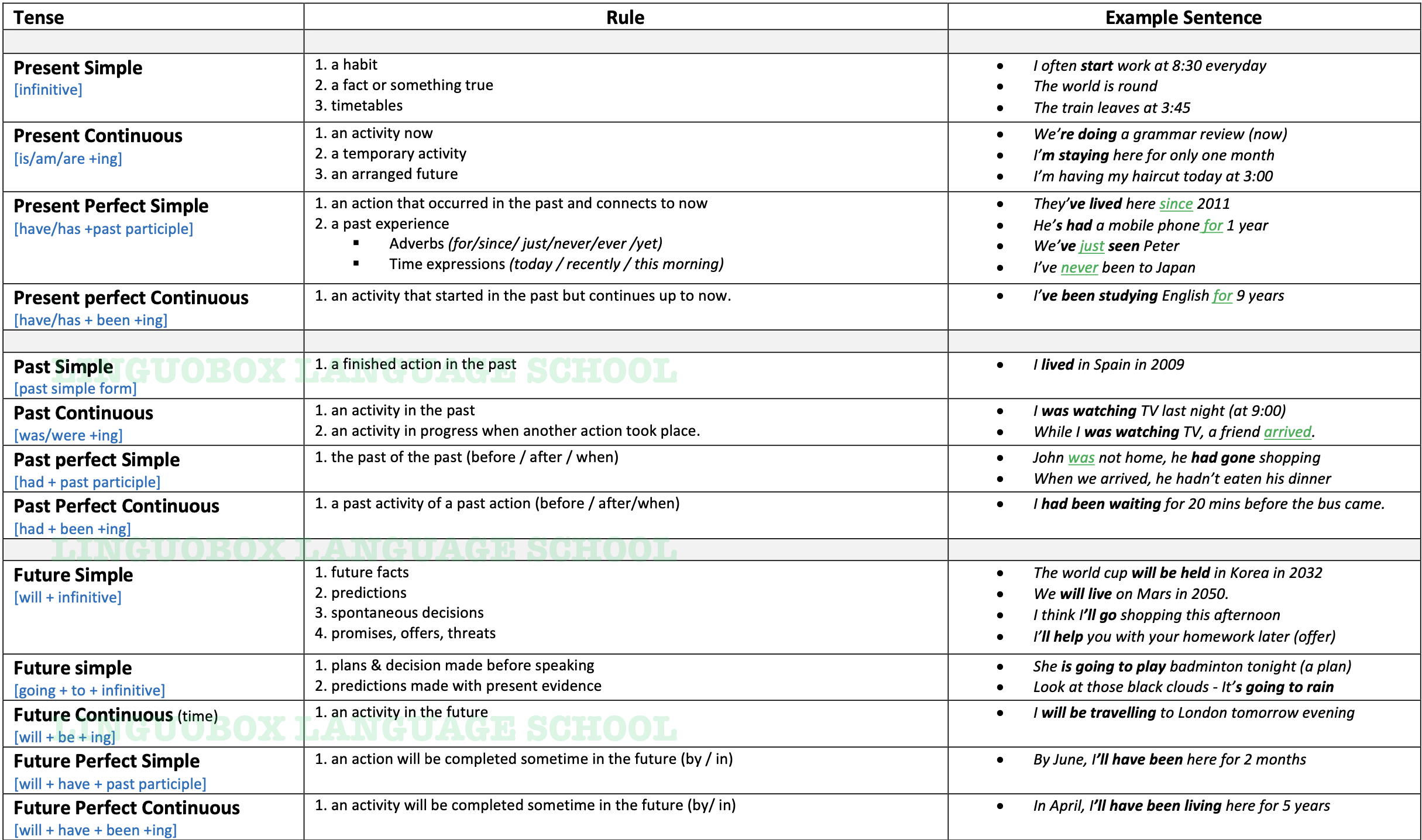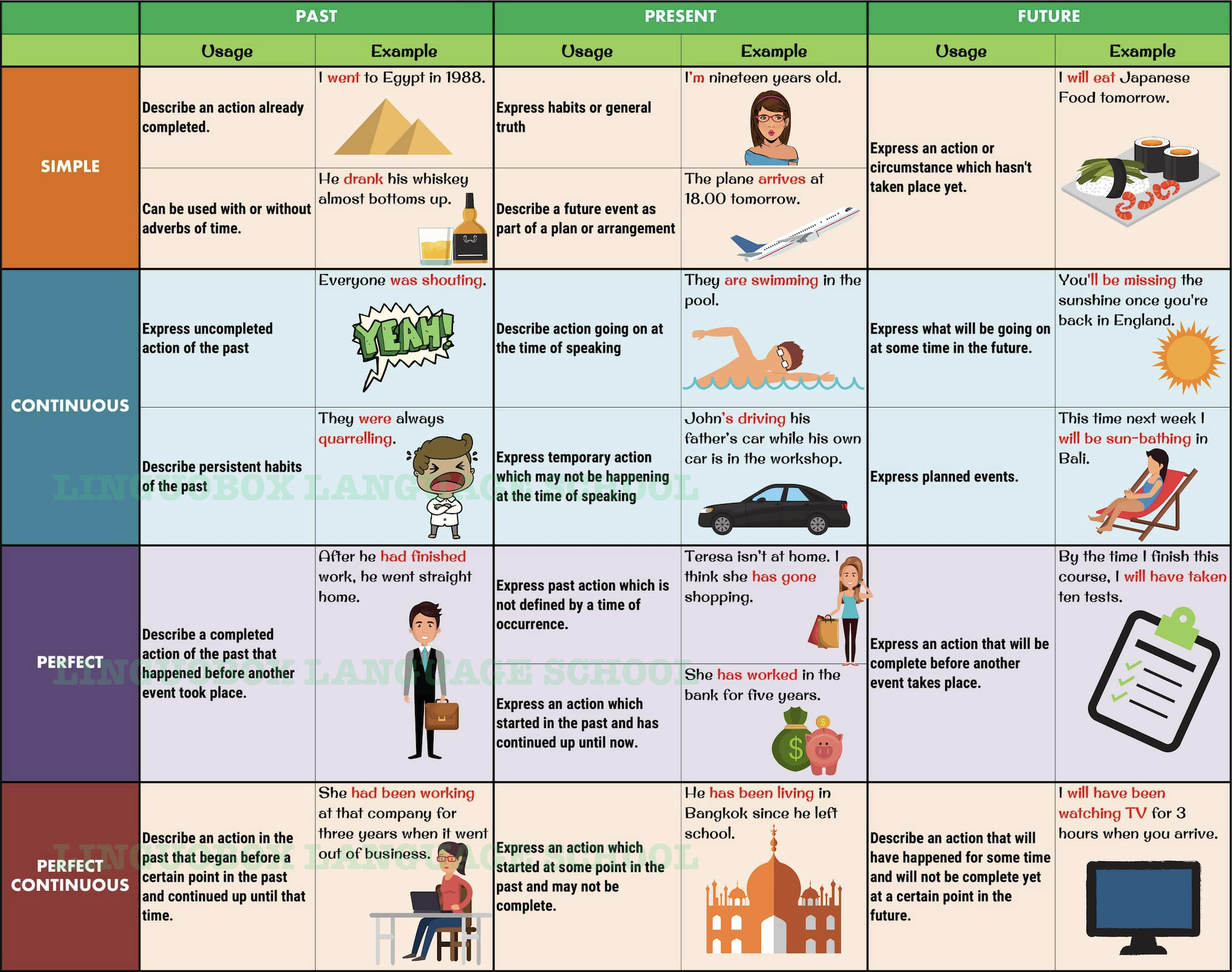زمان های اصلی انگلیسی و جنبه های آن را یکبار برای همیشه درست یاد بگیریم



شما هم مثله من همیشه در یادگیری زمان ها در زبان انگلیسی گیج می شدید؟ و ممکنه هنوز هم درک درستی از زمان های اصلی و جنبه های مختلفش نداشته باشی، درست آمدی اینجا من همه نکاتی رو که باید بدونی رو براتون جمع آوری می کنم که برای همیشه زمان ها و جنبه هاشون رو به درستی استفاده کنید.
در زبان انگلیسی ۳ زمان اصلی وجود دارد (زمان گذشته، حال، آینده) که هر کدام ۴ وجه دارند، شاید بپرسید چرا؟
خوب انگلیسی زبان ها دوست دارند بدانند کدام اتفاق(کار، عمل) قبل و یا بعد از اون یکی رخ داده و یا در حال رخ دادن است و یا می خواهد اتفاق بیفتد.
وجوه ساده، استمراری، کامل، کامل استمراری که هر کدام را در زمان خاصی و با توجه به نیاز بکار می گیرند.
۱- زمان حال ساده: حال ساده مهمترین و پرکاربرد ترین زمان زبان انگلیسی هست که اگر یک خظ صاف مانند یک محور را در نظر بگیرید وسط آن زمان حال، قبلش زمان گذشته و بعدش زمان آینده قرار می گیرد. مهمترین کاربردهای وجه ساده زمان حال به شرح زیر می باشند:
عادات همیشگی
چیزهایی که تکرار می شوند
موقعیت های دایمی
حقایق و واقعیت های پذیرفته شده
دستور العمل دادن، آدرس دادن
صحبت کردن در مورد داستان، فیلم، کتاب، نمایشنامه
Learn all about English 12 tenses and their applications at once
We have 3 main times in English Past, Present, Future
Each time has 4 aspects that we call them tenses
Simple, Continuous or progressive, Perfect, Perfect continuous
Present Simple
+ | verb/verb + (e)s | He plays tennis. |
- | do/does not + verb | She doesn't play tennis. |
? | do/does ... + verb? | Do you play tennis? |
We use the present simple
- to talk about regular habits or repeated actions:
I get up really early and practise for an hour or so most days.
I use the Internet just about every day.
Words that describe how often or when are often used (e.g. always, generally, normally, usually, often, sometimes, rarely, never, every day, every evening). - to talk about permanent situations:
My parents own a restaurant.
A We use the present perfect, not the present simple, to say how long something has continued:
I have worked there since I was 15. (not I work there since I was 15: see Unit 3) - to talk about facts or generally accepted truths:
Students don't generally have much money.
If you heat water to 100°C, it boils. (see Unit 17)
The following words are often used: generally, mainly, normally, usually, traditionally. - to give instructions and directions:
You go down to the traffic lights, then you turn left.
To start the programme, first you click on the icon on the desktop. - to tell stories and talk about films, books and plays:
In the film, the tea lady falls in love with the Prime Minister.
Present continuous
+ | am/is/are + verb + -ing | He's living in Thailand. |
- | am/is/are not + verb + -ing | I'm not living in Thailand. |
? | am/is/are ... + verb + -ing? | Are they living in Thailand? |
We use the present continuous
• to talk about temporary situations:
I'm studying really hard for my exams.
My cousin is living in Thailand at the moment. (= he doesn't normally live there) Words like at the moment, currently, now, this week/month/year are often used.
• to talk about actions happening at the moment of speaking: I'm waiting for my friends.
to talk about trends or changing situations:
The Internet is making ti easier for people to stay in touch with each other. The price of petrol is rising dramatically.
• to talk about things that happen more often than expected, often to show envy or to criticise with words like always, constantly, continually, forever:
My mum's always saying I don't help enough! (complaint)
He's always visiting exciting places! (envy)
3 State verbs
The present continuous is not normally used with state verbs because the meaning of the verb itself is a general truth rather than something temporary. These verbs describe thoughts, feelings, senses, possession and description.
Here are some examples of state verbs.
• thoughts: agree, assume, believe, disagree, forget, hope, know, regret, remember, suppose, think, understand
I assume you're too busy to play computer games.
• feelings: adore, despise, dislike, enjoy, feel, hate, like, love, mind, prefer, want Do you mind fi I ask you a few questions?
I love music.
• senses: feel, hear, see, smell, taste This pudding smells delicious.
• To talk about something happening now we use can: I can smell something burning.
possession: have, own, belong My parents own a restaurant.
• description: appear, contain, look, look like, mean, resemble, seem, smell, sound, taste, weigh You look like your mother. (= a permanent situation, not a temporary one)
A Some state verbs can be used in the continuous form when the meaning is temporary. Compare:
What are you thinking about? (now)
I think you should tell her exactly what happened. (my opinion, so not temporary)
I'm tasting the sauce to see if it needs any more salt. The sauce tastes delicious.
She's having a great time. (is having = is experiencing, not possession) Students don't generally have much money. (have = possession)
